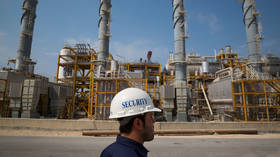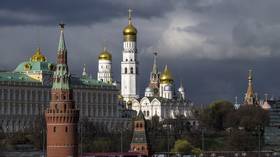Iran inks $13 billion worth of new oil deals

Iran’s energy companies were granted their biggest contracts in the past decade on Sunday, as Tehran seeks to boost output at major oil fields, state media have reported.
Deals worth $13 billion, aimed at developing deposits and increasing production by as much as 350,000 barrels per day, were signed in the presence of Oil Minister Javad Owji and National Iranian Oil Company (NIOC) Managing Director Mohsen Khojastehmehr.
The contracts were signed two days before the 73rd anniversary of the sector’s nationalization. Iranian oil fields had previously been operated by the British-controlled Anglo-Iranian Oil Company.
The move is expected to help Tehran leverage local resources to develop the energy sector. Last week, Iran said it had awarded $20 billion in contracts to domestic companies to ramp up production from the offshore South Pars gas field in the Person Gulf, shared with Qatar.
The output increase will be focused on six fields, including Azar, Azadegan, the country’s biggest deposit, and Masjed Soleyman, the oldest producing deposit in the Middle East. The first two are shared with Iraq along Iran’s western and southwestern borders.
Tehran’s pivot to local energy firms gained momentum back in 2018, when most multinationals quit the country’s energy market after former US President Donald Trump torpedoed the 2015 Iran nuclear deal, formally known as the Joint Comprehensive Plan of Action (JCPOA), by unilaterally ending Washington’s participation.
The Islamic Republic holds the world’s third-largest proven oil reserves, behind Venezuela and Saudi Arabia, according to the International Energy Agency (EIA), which ranked the nation as the seventh-biggest crude producer of 2022.
Iran produced 2.99 million barrels of oil daily last year, 440,000 more than in 2022, according to the EIA, which predicts a further rise of 160,000 barrels in 2024. Nikkei Asia reported earlier this year that crude oil exports from Iran surged 50% in 2023 to a five-year high of about 1.29 million barrels per day, with most supplies being shipped to China.
For more stories on economy & finance visit RT's business section













